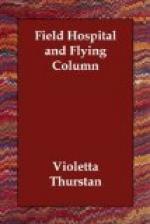All night long the most terribly wounded men were being brought in from the field, some were already dead when they arrived, others had only a few minutes to live; all the rest were very cold and wet and exhausted, and we had nothing to make them comfortable. What a blessing hot-water bottles would have been—but after all there would have been no hot water to fill them if we had had them. But the wounded had to be brought in for shelter somewhere, and at least we had a roof over their heads, and hot tea to give them.
At 5 A. M. there came a lull. The tragic procession ceased for a while, and we went to lie down. At seven o’clock we were called again—another batch of wounded was being brought in.
The shelling had begun again, and was terrific; crash, crash, over our heads the whole time. A clock-tower close to the hospital was demolished and windows broken everywhere. The shells were bursting everywhere in the street, and civilians were being brought in to us severely wounded. A little child was carried in with half its head blown open, and then an old Jewish woman with both legs blown off, and a terrible wound in her chest, who only lived an hour or two. Apparently she suffered no pain, but was most dreadfully agitated, poor old dear, at having lost her wig in the transit. They began bringing in so many that we had to stop civilians being brought in at all, as it was more than we could do to cope with the wounded soldiers that were being brought in all the time.
At midday we went to a hotel for a meal. There was very, very little food left in Lodz, but they brought what they could. Coming back to the hospital we tried everywhere to get some bread, but there was none to be had anywhere—all the provision shops were quite empty, and the inhabitants looked miserable and starved, the Jewish population particularly so, though they were probably not among the poorest.
On our way back a shell burst quite close to us in the street, but no one was hurt. These shells make a most horrible scream before bursting, like an animal in pain. Ordinarily I am the most dreadful coward in the world about loud noises—I even hate a sham thunderstorm in a theatre—but here somehow the shells were so part of the whole thing that one did not realize that all this was happening to us, one felt rather like a disinterested spectator at a far-off dream. It was probably partly due to want of sleep; one’s hands did the work, but one’s mind was mercifully numbed. Mercifully, for it was more like hell than anything I can imagine. The never-ending processions of groaning men being brought in on those horrible blood-soaked stretchers, suffering unimagined tortures, the filth, the cold, the stench, the hunger, the vermin, and the squalor of it all, added to one’s utter helplessness to do more than very little to relieve their misery, was almost enough to make even Satan weep.
On the third day after our arrival a young Russian doctor and some Russian sisters arrived to relieve us for a few hours, and we most thankfully went to bed—at least it was not a bed in the ordinary sense, but a wire bedstead on which we lay down in all our clothes; but we were very comfortable all the same.




